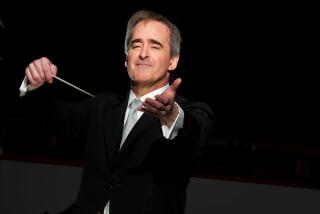MUSIC REVIEW : Rodney Gilfry in Recital at Pomona College
- Share via
Rodney Gilfry has stripped to his skivvies as Rossini’s Figaro and donned yellow wig and feathers as Mozart’s Papageno, both roles seen here courtesy of the Los Angeles Music Center Opera.
Tuesday, the strapping, handsome young baritone wore merely a stylish tuxedo when he sang a recital at Bridges Hall of Music at Pomona College.
The event, to benefit the Pomona-Inland Valley Council of Churches’ Hunger and Homeless Program, reportedly raised more than $12,000 from an overflow audience of about 700 patrons. Some of them had to be seated onstage flanking Gilfry and pianist Grant Gershon.
The occasion also was a happy homecoming for the baritone because he was born and raised in Claremont, the site of the college.
For all that, Gilfry’s skills as a recitalist could use further honing.
Generally he preferred phrasing by line or stanza and by dynamic, as opposed to specifically interpreting the texts. As the evening progressed, moreover, he sounded increasingly constricted in the heights, although the lower range remained lustrous and powerful.
He approached Schumann’s “Dichterliebe” as a reverie, a musing on love lost, even from the start. That’s a viable approach but even within that framework, he bypassed many opportunities to depict character and emotion.
He showed a greater variety of expression in Debussy’s “Trois Ballades de Villon” and four songs by Purcell, in which he also showed reasonable vocal agility.
At various times, he experimented with different accents. He sang Ives’ “Charlie Rutlage” with an aw-shucks Western yawl, and flashed a million-dollar smile after it was over. It was like a nudge in the ribs: “Gee, guys, this is a tall tale. Don’t take it too seriously.” Well, that’s one way of doing it. But Rutlage does die.
Ives’ “The Greatest Man” elicited a little-boy-Gilfry character--and that same smile after the close. It may have been more appropriate here, in a kid’s song about his dad, but the smile lost a little impact the second time round.
Gilfry’s German and French sounded more natural than some of his English in Purcell and Gershwin. He kept insisting, for instance, that it was “fascinatin’ reethym.”
Gershon did little to amplify the expressive possibilities, even in the solo epilogues in “Dichterliebe.” But he provided fluent support.
Encores included a steady account of “O du mein holder Abendstern” from Wagner’s “Tannhauser”, and “Joey, Joey, Joey” from “The Most Happy Fella.”
More to Read
The biggest entertainment stories
Get our big stories about Hollywood, film, television, music, arts, culture and more right in your inbox as soon as they publish.
You may occasionally receive promotional content from the Los Angeles Times.










